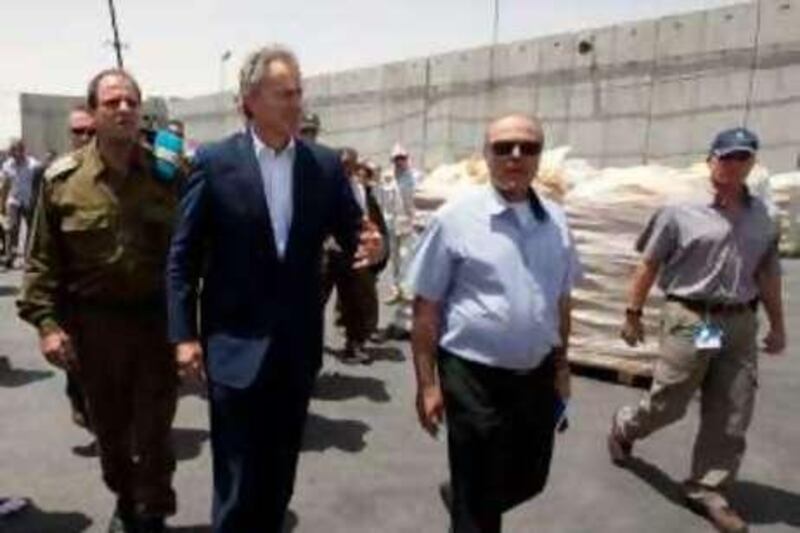RAMALLAH // Israel yesterday urged the UN to shelve plans for an international investigation into its navy's deadly raid last month on a flotilla of ships carrying humanitarian aid, the first sign that Israel is beginning to seek payback for easing its blockade on Gaza.
Speaking in New York after meeting Ban Ki-moon, the UN's secretary general, Ehud Barak, the Israeli defence minister, said he had told Mr Ban that "as long as ... new flotillas are in the preparation, it's probably better to leave it [a UN investigation] on the shelf for a certain time." Mr Barak also said he told Mr Ban that the current five-person panel that Israel formed last week, which includes two international observers, was "clearly independent, reliable, credible and should be allowed to work".
There was no immediate response from the UN. The UN's Human Rights Council on June 2 called specifically for an international inquiry, and pressure for such a probe is unlikely to end, especially from Turkey. Eight of the nine killed aboard the Mavi Maramara, a Turkish-flagged ship that was part of the six-boat flotilla intercepted by the Israeli navy on May 31, were Turks, while the other was an American national of Turkish origin.
That Turkey should be happy with any investigation was a point further underlined by Catherine Ashton, the EU's foreign policy chief, in remarks delivered at the European Parliament last Wednesday. Ms Ashton said Israel's own commission of inquiry was a "step forward", but added that the EU would wait for the findings of the committee "before drawing further conclusions". Those seeking clarity as to the events on board the Mavi Maramara will hardly be buoyed by the news yesterday that the same commandos that rapelled onto the deck of the Marmara under cover of darkness deep in international waters last month have been tasked with intercepting a new flotilla of aid ships, these from Lebanon, due to arrive this weekend.
Moreover, an army spokesman yesterday told the Israeli Yedioth Ahronot newspaper that, "all those harmed during the incident were extremists, not innocent civilians", further undermining confidence that Israel will be able to investigate itself thoroughly. The Israeli army maintains that the interception, while failing in some key intelligence areas, was broadly successful. The Israeli government may thus well feel that a substantial easing of the blockade on Gaza will be enough to head off significant pressure for an international inquiry. The position of Washington is in this case crucial.
The US administration on Monday welcomed the statement by the Israeli government announcing an easing of the blockade, with Robert Gibbs, a White House spokesman, saying the administration believed it "should improve life for the people of Gaza". But the US is at odds with several of its international partners on this point. The UN, along with the US a member of the international quartet of Middle East mediators that also includes the EU and Russia, has repeatedly called for a complete end to Israel's blockade on Gaza, and a UN spokesman yesterday repeated that message. Christopher Gunness, a spokesman for UNRWA, the United Nations relief agency that looks after Palestinian refugees, told news agencies on the sidelines of a conference in Cairo yesterday: "We need to have the blockade fully lifted.
"The Israeli strategy is to make the international community talk about a bag of cement here, a project there. We need full unfettered access through all the crossings." Turkey, too, is unlikely to be appeased by the easing of the blockade. Turkey, a Nato member, is also an important ally to the US in Iraq, more so as the date for the scheduled withdrawal of US troops draws nearer. Ankara so far shows no sign of being willing to step back from its demand for an international investigation.
Domestic pressure on the US administration to continue its unquestioned support of Israel may therefore clash in this instance with foreign US strategic considerations to ensure that the administration can stick to its timeline and leave a relatively stable Iraq, for which Turkey's assistance is crucial. Israel is gambling that the more time that passes, the more sentiments may cool and pressure for an international investigation will ease.
But Israel may yet have to take more steps to help Washington appease Turkey, by extending, for example, and for the sake of US-sponsored indirect negotiations with the PLO, its partial freeze on settlement construction in the West Bank and including explicitly East Jerusalem, if not fully ending the Gaza blockade. But with a government dominated by right-wing parties with deep ties to the settlement lobby, it is not clear how far Benjamin Netanyahu, the Israeli prime minister who has so far been forced onto the back foot by his navy's handling of the flotilla raid, can or will go towards pleasing the international community.
@Email:okarmi@thenational.ae





